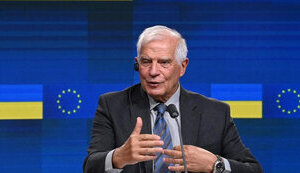
EU High Representative for Foreign Affairs and Security Policy Josep Borrell believes that the strategy chosen by the allies to respond to the Russian war against Ukraine is working and should be pursued.
He writes about this in an article published in Project Syndicate,
Borrel notes that the war has entered a new phase – the Ukrainian army has made a striking counteroffensive, and although it is not definitively clear how large it will be next, it is already clear that the strategic balance of power has shifted.
The diplomat notes that the EU has fully mobilized to solve the energy crisis with good results:
storage facilities are filled by more than 80% ahead of schedule, there is an agreement to reduce gas consumption during the cold season and measures to support consumers amid record prices, in coordination with the Group of Seven and other partners are discussing a price cap on Russian oil.
Also, Borrell writes, the West is helping the countries of the “global South” overcome the consequences of Russian aggression affecting them.
“Overall, the strategy is working. We must continue to support Ukraine, pressure Russia with sanctions and solidarity to help our partners around the world,” Josep Borrel notes.
He separately emphasizes the EU’s historic decision to reject Russian energy resources.
“The Kremlin has violated contracts by drastically reducing gas exports and destabilizing markets in the process. Being able to do this blackmail may look like a strength of the Russian Federation, but in the end it is a losing strategy. Contrary to popular belief, Russia cannot easily find a replacement for the European market, because most of its gas transportation infrastructure is aimed precisely at Europe. Changing gas flows to countries like China is about years of work and billions of dollars in costs,” the diplomat notes.
He admits that Russia de facto benefited from the record gas price increase, but this does not mean that the European sanctions do not work. “We have to wait for the full effect of Europe’s decision to stop importing energy from Russia. So far, Europe has only banned coal imports and reduced oil purchases,” Borrel reminds us.
Borrel notes that Russian coal exports have recently reached their lowest levels since Putin launched a full-scale war – and this shows that no other buyers can be found for it. Similarly, after the EU announced a 90 percent cut in Russian oil imports by the end of the year, oil prices began to decline. In addition, the Russian Federation will lose revenue if it continues to cut gas supplies to Europe.
The diplomat notes that Europe, by reducing dependence on Russian energy, increases its own security and frees itself from the outdated belief that economic interdependence should automatically contribute to the reduction of political tension – because now it is, on the contrary, used as a weapon.
The EU, he writes, must remain an open economy, but with safeguards for sustainability and diversification.
He also reminds that the entire Russian military-industrial complex was very dependent on access to Western technology, especially the most advanced weapons, and the merged internal document of the Russian government shows that many other areas of the economy that depended on imported materials, up to problems with the manufacture of SIM. cards, will also face problems.
Borrell notes that sanctions themselves are not enough to defeat the aggressor, and that is why the EU is providing Ukraine with a lot of economic, military assistance and is working on a training mission for the Ukrainian military.
“The war is not over yet, the Putin regime still has some cards to play. But with the West’s current strategy, the Kremlin has almost no chance of changing the situation in its favor. Time and history are on the side of the Ukrainians – as long as we stick to our chosen strategy,” concludes Josep Borrell.




